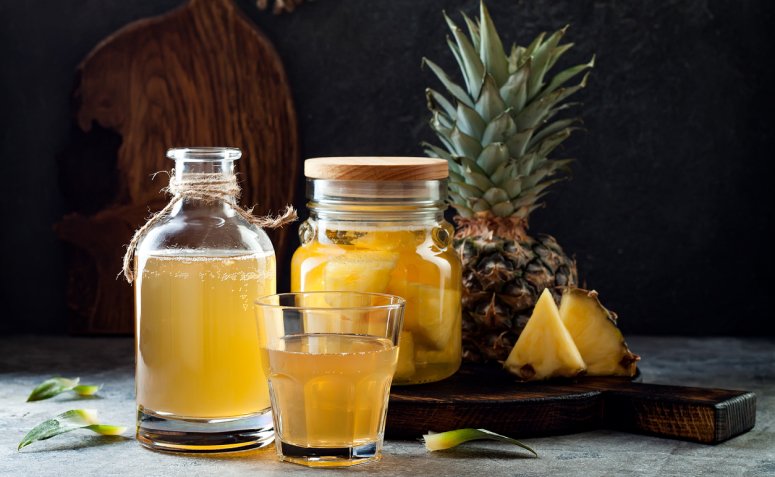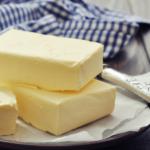
iStock
By Vanessa Fenelon
On 24.04.21
Pineapple peel tea is a tasty drink that has several health benefits. In addition, its consumption contributes to better use of the fruit, since it is prepared with a part of it that is not usually used. Check out, below, more information about the properties of this tea, as well as recipes and necessary care with the consumption.
Continued after ad
Contenus
7 benefits of pineapple peel tea for your health
There are many studies on the properties of pineapple peel and the advantages that its consumption brings to health. Below are the main benefits of this tea:
It has low caloric value
In addition to being low in calories, the tea is diuretic, which may contribute to weight loss. Studies have indicated that the pineapple peel « contains amounts of mineral matter, crude protein, and lipids very close to those of the pulp, and higher fiber content than the pulp, in addition to lower caloric value. In addition, the juice extracted from the peel was also low in carbohydrates and calories » (1).
It is rich in nutrients
Pineapple peel is a good source of essential nutrients for the human body. According to the same study, the residue is « very attractive for human nutrition, and can be used, for example, as an aid in the supply of essential amino acids given its protein content, and also as an alternative source of fibre for food » (1).
Aids in digestion
This is due to the fact that pineapple peel is rich in bromelin and fiber. The study points out that « both the peel and the central cylinder of the pineapple can be considered a good source of dietary fiber, which plays an important role in the digestive process » (1).
Has antioxidant action
Tea is rich in antioxidants, such as flavonoids and vitamins A and C. Another study points out that « the natural antioxidants present in pineapple peels have gained increasing interest, as several epidemiological studies have found their association with a lower risk of cardiovascular diseases, diabetes, obesity, neurodegenerative diseases, gastrointestinal disorders, and cancer » (2).
Improves immunity
Pineapple peel is rich in vitamin C. A third study indicates that this vitamin « is vital for proper immune system function, making it an important nutrient for preventing recurrent ear infections, colds, and flu » (3).
Has anti-inflammatory properties
Another benefit of the tea is its anti-inflammatory power. The study also highlights that these properties of pineapple peel « help reduce arthritis symptoms and pain after surgery and sports injuries » (3).
It is antimicrobial
The same study points out that pineapple peel has antibacterial, antiviral, antifungal and antiparasitic properties. According to it, pineapple « has antimicrobial properties and can be used in curing and preventing infectious diseases after normalization » (3).
Continued after announcement
In addition to these benefits, pineapple peel tea still has the advantage of using a part of the fruit that is not usually used. In other words, it’s a healthy and delicious way to avoid waste!
6 recipes for pineapple peel tea to test
How about learning varied recipes to enjoy all the benefits of pineapple peel tea? The preparations are simple, made with various ingredients and yield very tasty drinks. Check them out:
1. Simple pineapple peel tea
Ingredients
- Peel of 1 pineapple
- 1 liter water
Directions
- Cut the pineapple peel into very small pieces and set aside;
- Bring the water to a boil and bring to a boil;
- Turn off the fire, add the chopped peels, and cover to stifle;
- Leave the mixture to infuse for 30 minutes;
- When the tea has cooled, strain and refrigerate for 12 to 24 hours before consuming.
2. Pineapple peel tea with mint
Ingredients
Continued after ad
- 1 and 1/2 cups of water
- 1 teaspoon lemon juice
- Mint leaves
- Pineapple peel
Directions
- In a saucepan, heat the water with the lemon juice, mint leaves and pineapple peel;
- Let the mixture boil for about 10 minutes;
- Then, just strain through a fine sieve and serve hot or chilled!
3. Pineapple peel tea with ginger
Ingredients
- Peel of 1 pineapple
- 1 piece of ginger
- Mint leaves
- Water
Directions
- Place all ingredients in a saucepan and bring to a boil;
- Let the tea boil for about 15 minutes;
- Sweeten, if desired. After it has cooled, strain and set aside in the refrigerator.
4. Pineapple peel tea with cinnamon
Ingredients
Continued after ad
- 1 liter of water
- Peel of 1 ripe pineapple
- 1 cinnamon stick
Directions
- Bring the water to a boil, and when boiling, turn off and add the pineapple peel and cinnamon;
- Set the mixture aside for 30 minutes;
- Consume on the spot or store in the refrigerator in a glass bottle.
5. Pineapple peel tea with hibiscus
Ingredients
- 1.5 liter of water
- Peel 1/4 of pineapple
- 1 cinnamon stick
- 1 tablespoon hibiscus
- Orange peel
Directions
- Place the water in a saucepan and bring to a boil;
- When almost boiling, add the pineapple and orange peels, the cinnamon, and the hibiscus;
- After it boils, wait about 5 minutes and turn off the fire;
- Reserve the mixture until it reaches the desired temperature for consumption.
6. Pineapple Iced Tea
Ingredients
- Peel of 1 pineapple
- 500 ml water
- Pieces of pineapple
- 1 sprig of mint
- Juice of 1 titi lemon
- Ice
Directions
- In a large saucepan, place the pineapple peels and the water;
- Bring to a boil and add the pieces of pineapple;
- After it has boiled a little, turn off the fire and strain the tea, transferring it to a pitcher;
- Add the mint and lemon juice and allow to cool;
- Finally, add the ice and serve chilled!
Whether cold or hot, pineapple peel tea is a great drink to add more flavor and health to your day to day. Before you choose your favorite version to try, check out the necessary precautions for consumption in the next topic.
Care and contraindications
As for cautions about consuming pineapple peel tea, one study indicates that in excess, the fruit can cause sensitivity in the mouth, including lips, tongue, and cheeks. In addition, it warns that « extremely high amounts of bromelain may cause skin rashes, vomiting, diarrhea, and excessive menstrual bleeding » (4), and the tea is contraindicated during pregnancy.
Interactions between bromelain and some medications may also occur. « Those taking antibiotics, anticoagulants, anticonvulsants, barbiturates, benzodiazepines, insomnia medications, and tricyclic antidepressants should use caution » (4).
Did you like learning more about the preparation and consumption of pineapple peel tea? To continue using plants as allies of your health, take advantage and also know these 7 diuretic tea options!



